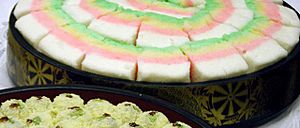Mujigae-tteok facts for kids
 |
|
| Alternative names | Rainbow rice cake |
|---|---|
| Type | Tteok |
| Place of origin | Korea |
| Associated national cuisine | Korean cuisine |
| Main ingredients | Rice flour |
| Korean name | |
| Hangul |
무지개떡
|
|---|---|
| Revised Romanization | mujigae-tteok |
| McCune–Reischauer | mujigae-ttŏk |
| IPA | [mu.dʑ.gɛ.t͈ʌk̚] |
| Hangul |
색떡
|
| Hanja |
色-
|
| Revised Romanization | saektteok |
| McCune–Reischauer | saekttŏk |
| IPA | [sɛk̚.t͈ʌk̚] |
| Hangul |
색편
|
| Hanja |
色-
|
| Revised Romanization | saekpyeon |
| McCune–Reischauer | saekp'yŏn |
| IPA | [sɛk̚.pʰjʌn] |
Mujigae-tteok (무지개떡) is a special Korean treat. It is also called rainbow rice cake. This delicious tteok (rice cake) has many colorful layers. These layers look just like a rainbow!
Koreans often serve mujigae-tteok at big celebrations. These include important parties or feasts. For example, it is popular at a doljanchi, which is a baby's first birthday. It is also served at a hwangapjanchi, a celebration for someone's 60th birthday. Other names for mujigae-tteok are saektteok (색떡) and saekpyeon (색편). Both of these names mean "colored rice cakes."
Contents
How to Make Rainbow Rice Cake
Making mujigae-tteok is similar to making other rice cakes. But it has a special step: adding food coloring. This makes it different from plain white rice cakes like baek-seolgi.
Ingredients and Mixing
First, you need non-glutinous rice. This rice is soaked and then ground into flour. Next, the rice flour is mixed with something sweet. This can be honey or a sugar solution. After mixing, the flour is rubbed between the hands. This makes sure all the ingredients are mixed well. Then, the mixture is sieved to make it smooth.
Adding Colors
Now comes the fun part: adding colors! Natural food colorings are used to create the rainbow effect.
- Yellow color often comes from gardenia.
- Grey color can come from rock tripe powder.
- Green color is made from mugwort powder.
- Pink color often comes from devil's-tongue powder.
These colors are mixed with a little water.
Steaming the Layers
Finally, the colored and plain white rice flour mixtures are ready. They are carefully laid in layers. Each layer is about 2 centimetres (0.79 in) thick. These layers are placed in a special steamer called a siru. The siru is lined with a cloth. Then, the layered rice cake is steamed until it is perfectly cooked.
See also
 In Spanish: Mujigae tteok para niños
In Spanish: Mujigae tteok para niños
 | George Robert Carruthers |
 | Patricia Bath |
 | Jan Ernst Matzeliger |
 | Alexander Miles |

